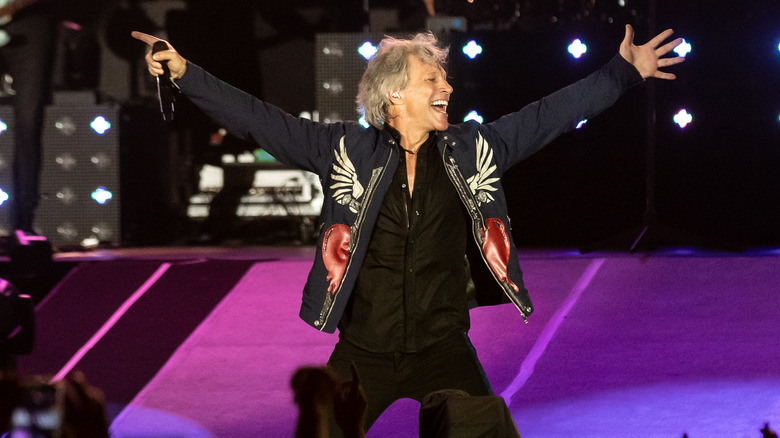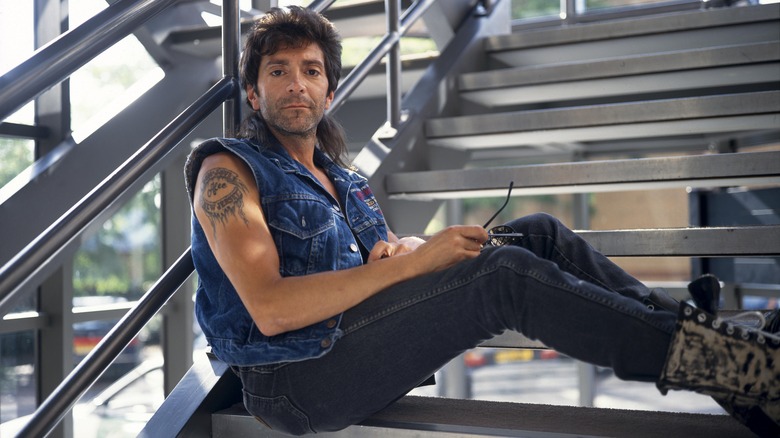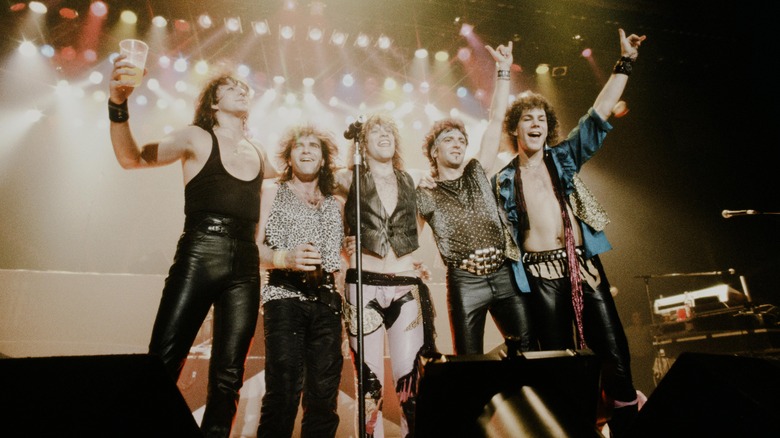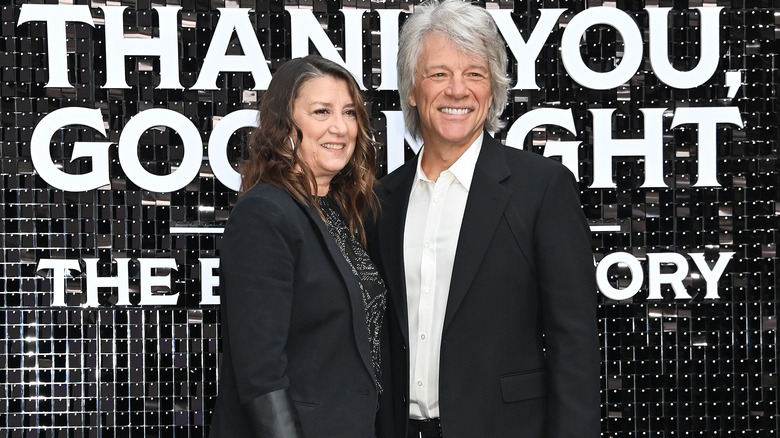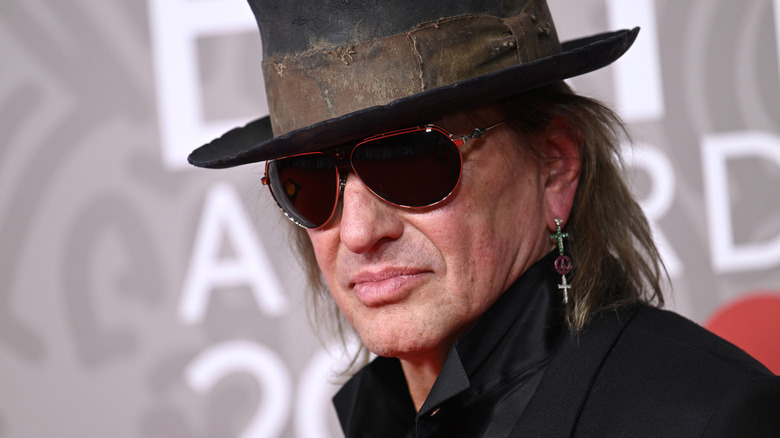What Hulu's Bon Jovi Documentary Series Left Out Of The True Story
The 1980s were a weird and wonderful time, and anyone who says they don't have a favorite among the classic 80s hair bands — many of which continue to tour today — is either lying or in denial. They are, after all, collectively responsible for countless songs that have shaped the cultural landscape of the decades that followed, and Bon Jovi was at the forefront. "Slippery When Wet" was released in 1986, and it's a scientific fact (maybe) that anyone born after that date came into this world already knowing the lyrics to both "Wanted Dead or Alive" and "Livin' On A Prayer."
It makes sense, then, to find out that Jon Bon Jovi has been lifelong friends with fellow New Jersey native Bruce "Don't Call Him The Boss" Springsteen. That's just one of the fascinating things revealed in the Hulu documentary "Thank You, Goodnight: The Bon Jovi Story," and according to what Bon Jovi told USA Today, they kept their friendship on the down-low for a long time simply because, "I've just known the guy for 45 years and he happens to be like a big brother."
The documentary clocks in at a whopping five hours, and it covers a lot of ground. Starting at the beginning of the band and continuing right up to the present day, the documentary hits the high points and the lows, as Bon Jovi explained that he wanted it to be an honest look at things. Did it miss anything that should have been included?
Alec John Such wasn't interviewed
Alec John Such was one of the original members of Bon Jovi, spending 11 years with the group before retiring to live a quiet life of motorcycles, comic books, and managing the group 7th Heaven. Given his contributions to some of their biggest songs — including "You Give Love a Bad Name" and "Bad Medicine" — it's kind of surprising that he doesn't appear on the otherwise wildly in-depth documentary. When Such left, he cited lifestyle burnout as the reason, and when he passed away in 2022, Bon Jovi tweeted, "Alec was always wild and full of life. Today those special memories bring [a] smile to my face and a tear to my eye. We'll miss him dearly."
There was clearly no bad blood — they reunited in 2018 for their induction into the Rock & Roll Hall of Fame, after a long-standing feud with chairman Jann Wenner — and he wasn't interviewed for Hulu's documentary simply because he had passed away not long before filming got underway.
Bon Jovi told The Hollywood Reporter that there was nothing malicious behind Such's absence, and it was quite the opposite. "[Alec's] passing was dramatic," he said. "It was the first time we faced mortality. One of us passed. It was one of the guys." At the time of Such's death, he had a net worth of around $10 million.
Opinions of other contemporaries, historians, and experts
There is a sneaky sort of omission in Hulu's "Thank You, Goodnight: The Bon Jovi Story," and at a casual watch, it might not even be noticeable. While the documentary does a great job of interviewing key players in the story — past and present — it lacks independent and outside expertise, criticism, and observation. What does that mean?
Documentaries should be objective, and that's tough to achieve when all the featured talking heads were in the thick of things. While it could be argued that there are no better people to tell the story of Bon Jovi than the founding members of Bon Jovi, there's still something missing: an outside perspective on the impact of the band on the era's music scene, on fans, and on those who were on the outside looking in. Given that they've sold around 130 million albums, it's safe to say there's a story to be told here, too.
While it's an excellent documentary, could it have been made better by including the impact the band had on the music scene? How they helped shape the era of MTV and the music video? It may have, in fact, been improved by outside observers.
There's only a single woman interviewed
There's only one woman interviewed for the documentary, and that's Jon Bon Jovi's wife, Dorothea Bongiovi. (It's their daughter, Stephanie, who's at the center of an incident that Bon Jovi revealed was the worst time he ever experienced as a father.) The couple met when they were in high school and have been together (mostly) ever since, which means she was on the front lines for the entirety of the band's existence.
While she's a logical choice for speaking on the documentary, the lack of a female perspective is a sad one — particularly when you consider it's the female fans that have allowed Bon Jovi to stay relevant for decades. And that's not an exaggeration.
In 2016, Forbes spoke with biographer Bryan Reesman about the lasting popularity of Bon Jovi — and Reesman said that without their female fans, they wouldn't have lasted. There were a few things in play here, and it started back in the 1980s. Reesman explained, "[Bon Jovi was] a little raunchy, but it was safe enough that a lot of girls wanted to go to the shows. It was a look and a sound, it was sexy without being too sexual." He continued to explain that Bon Jovi continued to release songs that related to that core group of fans: "Now they have songs that reflect some wisdom and maturity that female fans who have grown up with them have gained." And that would have been a brilliant thing to see reflected in their story.
Richie Sambora's side of the story
Longtime guitarist Richie Sambora is one of the members of Bon Jovi that's interviewed for "Thank you, Goodnight: The Bon Jovi Story." That's both surprising and not surprising, as Sambora's departure from the band came pretty suddenly in 2013. There were a ton of rumors, and a few months after his sudden departure, Sambora issued a statement saying that touring has simply gotten to be too much, and he'd suddenly realized how much of his daughter's life he was missing out on.
Jon Bon Jovi has always stressed that there's no ill will there, and yes, Sambora was on stage performing with them for their 2018 induction into the Rock & Roll Hall of Fame. Bon Jovi told People, "Just to be clear, there was nothing but love. There was never a fight. ... He had to deal with his other issues." He also said that he and Sambora got together to watch about three-quarters of the documentary together, and while that sounds great ... why not the whole thing?
According to those in Sambora's camp, it's because he felt as though the documentary had been edited in a way that left out his truth. The anonymous source said, "Richie left ... because he was sick and tired of what he was seeing. He didn't like the way he was being cast. He disagrees with how they framed his departure from the band and to him, the currency of happiness is more important than the currency of money."
